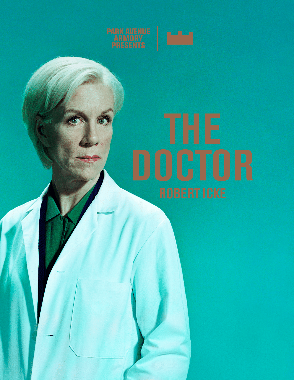A DOCTORED PLAY
NURSED BY JULIET STEVENSON
Robert Icke’s adaptation of Viennese dramatist Arthur Schnitzler’s 1912 play, Professor Bernhardi might have been an interesting, if somewhat confusing, play about a hodgepodge of ideas if not for Juliet Stevenson, who emerges as a majestic and moving presence that presides over the stage like the Colossus of Rhodes.
Juliet Stevenson
Schnitzler called his play a “comedy in five acts.” But it was really an attack on antisemitism, which is why it was banned in Austria until the collapse of the Austro-Hungarian Empire. Icke’s adaptation makes antisemitism just one of many themes that include racism, feminism, sexual identity, colonialism and suicide, to name a few.
The cast of The Doctor
What’s more, Schnitzler’s play has a single plotline concerning Professor Bernhardi, a Jewish physician who refuses to allow a priest to administer the last rites to a young woman dying of sepsis following an abortion. He makes this decision because she is unaware of her dire condition, and he wants her to die peacefully. Icke has turned Professor Bernhardi into Dr. Ruth Wolff, a British Jew, founder of the Elizabeth Institute, and given her a lesbian lover (Juliet Garricks) and a transgender teenager (Matilda Tucker) for a friend. This may add appeal to a modern audience, but it also dilutes the original message of Schnitzler’s work.
Juliet Stevenson and Juliet Garricks
Icke, in a perverse attempt to cloud the obvious, has also made some decisions that confuse. The patient, a 14-year-old girl, is delirious, so it is not clear what effect the priest will have on her. And she has been admitted to a hospital whose main mission is the study of Alzheimer’s Disease, which seems odd. In addition, Icke has cast several characters contrary to gender and race. Although the last choice may be his way of getting the audience to question identity, many people are more likely to question what he is doing.
Matilda Tucker
Because in The Doctor, the real enemy is identity politics, which tribalizes society, turning groups of people into enemy camps. In the second act panel discussion, it becomes clear that when everyone has a specific bone to pick there will eventually be no bone left. As intelligent and passionate as she might be, Dr. Wolff is helpless in her combat with this mighty force.
John McKay
This is quite a hot topic in itself, but to increase the urgency of his point, Icke has added a live drummer. At times, this seems a bit extraneous, but it is nevertheless an interesting touch.
Hannah Ledwidge on drums in The Doctor
As written, Dr. Wolff is not a particularly likeable character. She is imperious, self-righteous and short-sighted. She is also not particularly believable. How could a woman so unaware of the importance of politics and social engagement have come so far?
Naomi Wirthner and Juliet Stevenson
But in Stevenson’s hands, Dr. Wolff is both sympathetic and believable. We feel her pain. We want her to triumph against all odds. If this is not acting magic, I don’t know what is.
Doña Croll
photos by Stephanie Berger Photography/Park Avenue Armory
The Doctor
Wade Thompson Drill Hall
Park Avenue Armory
running time: 2 hours and 45 minutes with one intermission
ends on August 19, 2023
for tickets, call 212.933.5812 or visit Armory

